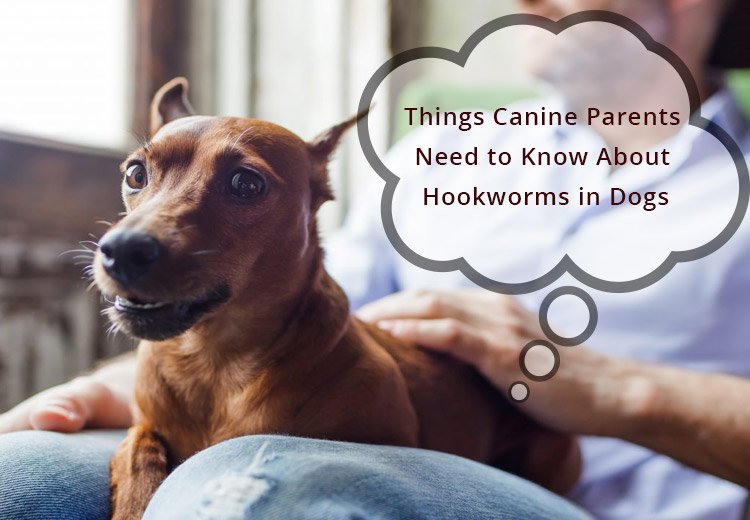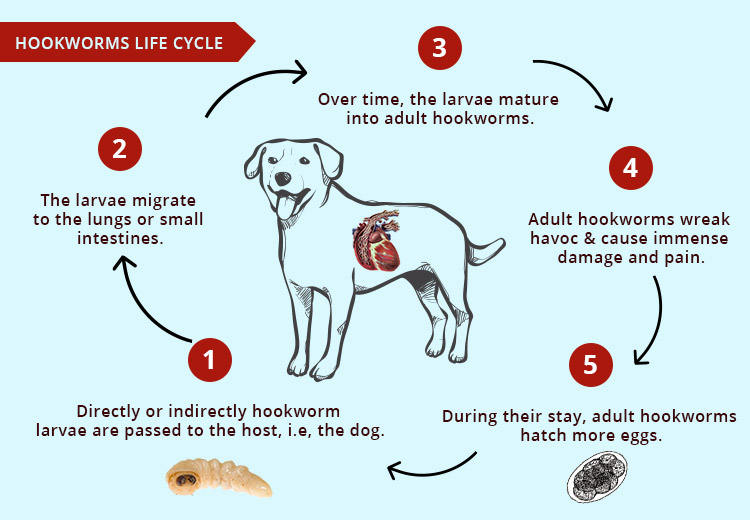 Dec 19, 2019
Dec 19, 2019

One of the most common intestinal parasites that affect a large population of dogs globally is hookworms. These types of worms are not really life-threatening or deadly, but they can be if proper and prompt action is not taken against them. Moreover, hookworms cause a lot of blood loss in younger puppies and can prove to be very fatal. Thus, keeping that in mind, we have written this blog, which will cover up everything related to hookworms in dogs, so read carefully.
Hookworms are simply worms that have a hook-like shape (the name is a giveaway, really). They are approximately an inch long and are relatively thin. These worms have hook-like teeth, which help them to cling onto the intestinal walls in the host’s body. Additionally, hookworms tend to detach themselves and go gallivanting to other parts of the body and in the process, leave behind bleeding ulcers. Such worms only happen to get fatal when they spend a decent amount of time in the intestinal walls. Thus, removing them as quickly as possible is very important.
In North America, especially in the USA and Canada, there are mainly three kinds of canine hookworms that meander in the wild. They are as follows:
• Ancylostoma canium (tropical regions in America)
• Ancylostoma braziliense (between Florida to South Carolina)
• Uncinaria stenocephala (Northern US and most parts of Canada)

Hookworms are tiny nematodes that can be found in the small intestines of dogs. Their life cycle commences when the eggs are released into the environment via animal stools. These eggs are then ingested by the pet by way of licking the ground or while groom themselves. Once they manage to enter, over a brief span of time, these hatchlings develop and mature into adult hookworms. These adult hookworms then attack the pet, causing immense pain and damages. The worms live and breed within the intestinal walls and during this time, they hatch more eggs and the process is repeated all over again until they are completely destroyed.
There are numerous signs and symptoms that could lead to hookworm diagnosis. The below-given points are the common signs and symptoms that your dog could have hookworm infection.
• Anemia
• Diarrhea
• Excessive coughing
• Increase in appetite
• Lethargic
• Reduction in weight
• Skin irritation
• Dark and bloody stool
• Weakness
• Worms in feces
If you suspect any of these signs or symptoms, rush your pet to the vet and get him diagnosed so that treatment can begin at the earliest.
The easiest and most effective way to treat and relieve dogs from hookworm infection is by opting for wormers. There are several worming treatments available that are excellent at not only getting rid of worms like hookworms but also preventing it from re-occurring for at least a few weeks.
These worming solutions are potent wormers that help in treating various kinds of worms including hookworms.
• Popantel Allwormer
• Cazitel Flavored Allwormer
• Endogard
• Drontal Plus
• Paragard Allwormer
• Triworm-D Dewormer
• Mediworm Plus
All these wormers are easily available in nearby pet shops or on online pet stores such as www.petcareclub.com!
How to Effectively Avoid Hookworms?
Hookworms, as a matter of fact, worms in general, can be effectively avoided, provided you follow these essential pointers.
- Keep your surroundings and the environment clean
- Clean your yard and remove all waste including dog waste
- Prevent your dog from consuming stuff in the yard and elsewhere
- Make use of the many worming preventatives available in online stores
Remember, hookworm infection is a communicable condition (meaning, the disease is transferable from one pet to another) as well as it can affect humans too. Thus, ensure to visit a vet and/or get rid of them as soon as you notice the signs and symptoms. The quicker you are, the safer you and your furry pal will be!
 Mar 11, 2024
Mar 11, 2024
As pet parents, we always want the best for our furry friends. One of the most important aspects of pet care is ensuring that they are free...
 Feb 14, 2024
Feb 14, 2024
Pet parenting is not a walk in the park, especially with insects like fleas and ticks around. However, the ever-evolving veterinary medicin...